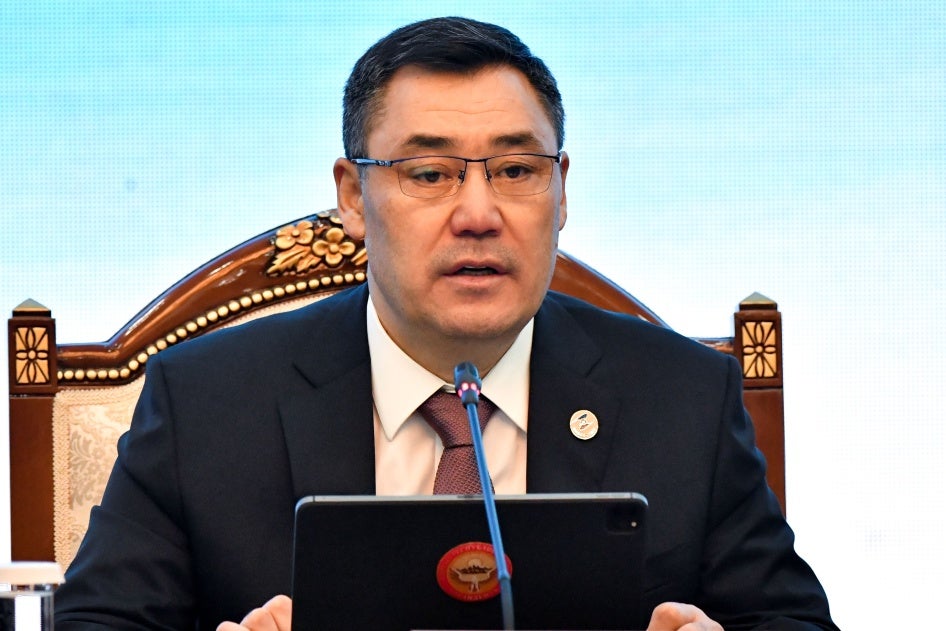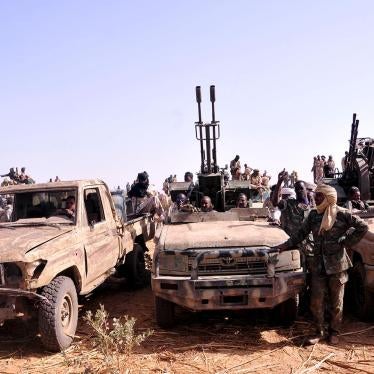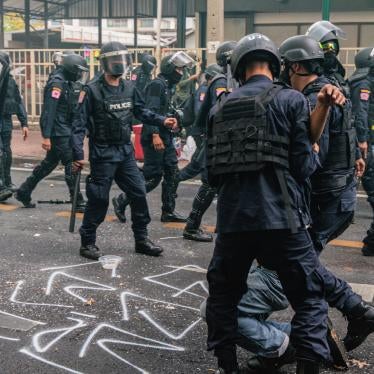(New York, March 15, 2024) – Kyrgyz President Sadyr Japarov should support Kyrgyzstan’s nongovernmental sector and withdraw the abusive “foreign representatives” draft law aimed at silencing the country’s vibrant and vocal civil society, Human Rights Watch said today. The draft law passed its third parliamentary reading on March 14, 2024, and the president has a month to decide whether to sign it.
The bill would require nongovernmental organizations receiving foreign funding and engaging in vaguely defined “political activities” to be listed on a special registry of “foreign representatives.” They would also have to label all their publications as “produced and distributed by a noncommercial organization performing the functions of a foreign representative” or acting in the interests of their foreign funders. The draft is similar to laws in Russia that have been condemned by the European Court of Human Rights as violating, among other standards, the rights to freedom of association and freedom of speech.
“Advocating the rights of vulnerable groups is a legitimate activity that the government should support, not restrict,” said Tirana Hassan, executive director at Human Rights Watch. “Kyrgyzstan has signed on to numerous international and regional agreements that confirm that seeking resources from national, international, and foreign sources is an inherent part of the right to freedom of association.”
The draft law was introduced in May 2023, passed its first reading on October 25, and second reading on February 22. In addition to introducing the discriminatory and misleading label of “foreign representatives,” the draft law would also grant the government significantly enhanced oversight powers. These would include the right to participate in the internal and external activities of these nongovernmental organizations and to check their expenditures, ostensibly to determine if they are consistent with the organization’s founding purpose.
The bill defines political activity as anything involving the organization of public events and direct action, engaging in electoral processes, advocating to governmental bodies, or disseminating opinions through “modern information technologies’ “that shape people’s socio-political views.
This overbroad definition of political activity is a grave threat to the right of nongovernmental and noncommercial organizations to freely engage in their legitimate activities, Human Rights Watch said. These include protecting various groups of the population, civic education, and monitoring and raising concerns about the country’s civil and political situation.
Singling out nongovernmental organizations receiving foreign funding as ‘foreign representatives’ further stigmatizes Kyrgyzstan’s civil society and human rights defenders, Human Rights Watch said.
Kyrgyzstan’s international partners, in particular the European Union, the United States, the United Kingdom, France, Canada, and Germany issued a joint statement expressing their concern about the negative consequences of the legislation and urging President Japarov not to sign it. They said the draft “contravene(s) international norms,” may “hurt the most vulnerable” in society, and would “jeopardize our ability to provide assistance that improves the lives of the citizens and residents of the Kyrgyz Republic.”
On March 11, Matteo Mecacci, director of the Organization for Security and Cooperation in Europe’s (OSCE) Office for Democratic Institutions and Human Rights said the bill would have a negative impact on civil society, human rights defenders, and the media. OSCE also said it would “harm Kyrgyzstan’s international cooperation” due to its extremely repressive nature that allows greatly expanded government control over the activities of nongovernmental organizations and independent media.
On October 6, 2023, in a joint letter, three UN special rapporteurs noted that the draft law would have a “chilling effect on the operation of all associations in the Kyrgyz Republic,” curtailing their capacity to provide social services and advocacy for human rights, and unduly restricting their freedom of opinion and speech. In a resolution from July 13, 2023, the European Parliament called on the Kyrgyz authorities and members of Parliament to review the draft law as it contravenes Kyrgyzstan’s international commitments.
The draft law is also inconsistent with Kyrgyzstan’s commitments to uphold its international human rights obligations at home and abroad as a member of the United Nations Human Rights Council.
Until the February reading, the draft law included a provision for up to 10 years in prison for establishing or participating in a nongovernmental organization found to be “inciting citizens to refuse to perform civic duties or to commit other unlawful deeds.” That provision was removed from the draft.
“The Kyrgyz government should see civil society organizations, grassroots movements, and human rights defenders as its allies in building a thriving and inclusive society, and ensure an enabling environment that fosters diversity of opinion and freedom of association,” Hassan said. “President Japarov should withdraw the draft law and guarantee continued freedom and openness for Kyrgyzstan’s diverse civil society.”









